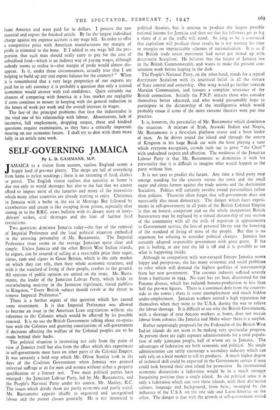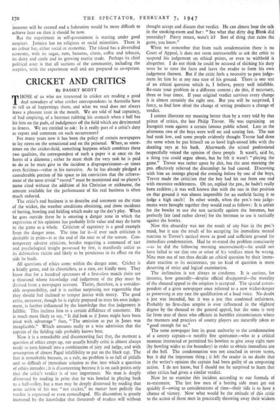SELF-GOVERNING JAMAICA
By L. D. GAMMANS, M.P.
JAMAICA to a visitor from austere, sunless England seems a happy land of pre-war plenty. The shops are full of everything from hams to nylon stockings ; there is no rationing of food, clothes or petrol. The English visitor realises that austerity at home is due not only to world shortages but also to the faot that we cannot afford to import most of the luxuries and many of the necessities which many other countries are already starting to enjoy. Christmas in Jamaica with a bathe in the sea at Montego Bay followed by strawberries and cream is like escaping from prison, especially after tuning in to the B.B.C. news bulletin with its dreary story of lorry- drivers' strikes, ccal shortages and the hint of further food restrictions.
Two questions dominate Jamaica today—the fear of the removal of Imperial Preference and the local political situation embodied in the arresting personality of Mr. Bustamente. The Imperial Preference issue seems to the average Jamaican quite clear and simple. Unless Jamaica and the other British West Indian islands, he argues, can be assured of selling at a reasonable price their sugar, citrus, rum and cigars in Great Britain, which is the only market on which they can rely, then their whole economic structure, and with it the standard of living of their people, crashes to the ground. All sections of public opinion are united on the issue. Mr. Busta- mente, the leader of the Jamaican Labour Party, which holds an overwhelming majority in the Jamaican legislature, stated publicly in Kingston, "Every British subject should revolt at the threat to remove Imperial Preference."
There is a further aspect of this question which has caused some resentment. It is that Imperial Preference was allowed to become an issue in the American Loan negotiations without any reference to the Colonies which would be affected by its possible removal. It is no use the British Government talking about co-opera- tion with the Colonies and granting constitutions of self-government if decisions affecting the welfare of the Colonial peoples are to be made behind their backs.
The political situation is interesting not only from the point of view of Jamaica itself but also from the effect which this experiment in self-government must have on other parts of the Colonial Empire. It was certainly a bold step which Mr. Oliver Stanley took in the days of the Coalition Government when Jamaica was granted universal suffrage at 21 for men and women without either a property qualification or a literacy test. Two main political parties have emerged: the Jamaican Labour Party, led by Mr. Bustamente, and the People's Nat;onal Party under his cousin, Mr. Manley, K.C. The issues which divide them are partly economic and partly social. Mr. Bustamente appeals chiefly to organised and unorganised labour and the poorer classes generally. He is not interested in political theories, but is anxious to produce the largest possible national income for Jamaica and then see that his followers get as 1:);?, a share of it as the traffic will stand. So long as he is convinced that capitalism will produce these results he is not wasting his time or energies on impracticable schemes of nationalisation. It is as if the British trade union movement had never got mixed up with doctrinaire Sccialisni. He believes that the future of Jamaica lies in the British Commonwealth, and wants to make the present con- stitution work before leaping in the dark.
The People's National Party, on the other hand, stands for a typical doctrinaire Socialism with its uncritical belief in all the virtues of State control and ownership. One wing would go further towards Marxian Communism, and favours a complete severance of the British connection. Socially the P.N.P. attracts those who consider themselves better educated, and who would presumably hope to participate in the dictatorship of the intelligentsia which would probably ensue if some of the more extreme theories were put into practice.
It is, however, the personality of Mr. Bustamente which dominates the situation. A mixture of Irish, Arawaki Indian and Negro, Mr. Bustamente is a first-class platform orator and a born leader of men. As he drives round the island and through the streets of Kingston in his huge Buick car with the horn playing a tune which everyone recognises, crowds rush out to greet "the Chief" with undoubted respect and affection. The weakness of the Jamaican Labour Party is •that Mr. Bustamente so dominates it with his personality that it is difficult to imagine what would happen to the party without him.
It is not easy to predict the future. Any time a third party may emerge standing for the country versus the town and the small sugar and citrus farmer against the trade unions and the doctrinaire Socialists. Politics will certainly revolve round personalities rather than policies. Theorists often forget that self-government does not necessarily also mean democracy. The danger which faces experi- ments in self-government in all parts of the British Colonial Empire is that an honest, competent and on the whole inexpensive British bureaucracy may be replaced by a virtual dictatorship of one section of the community with all the evils of nepotism in appointments to Government service, the loss of personal liberty and the lowering of the standard of living of most of the people. But that is no argument for refusing to consider political changes Jamaica has certainly adopted responsible government with great gusto. If the pot is boiling, at any rate the lid is off and it is possible to see what is happening inside.
Although in comparison with war-ravaged Europe Jamaica seems happy and prosperous, she has many economic and social problems to solve which will demand the highest qualities of statesmanship from her new government. The coconut industry suffered severely from a hurricane in 1944. No cure has yet beer, discovered for the Panama disease, which has reduced banana-production to less than half the pre-war figures. There is a continual drift from the country- side to the towns ; there is some unemployment and much hidden under-employment. Jamaican 13 orkers earned a high reputation for themselves when they went to the U.S.A. during the war to relieve the labour shortage. It is difficult to see why the British Government, with a shortage of over 600,000 workers at home, does not recruit labour from colonies like Jamaica and Malta wherP there is a surplus.
Rather surprisingly proposals for the Federation of the British West Indian islands do not seem to be making very spectacular progress. At present there are eight separate administrations for a total popula- tion of only 3,000,000 people, half of whom are in Jamaica. The advantages of federation are both economic and political. No single administration can safely encourage a secondary industry which can only rely on a local market to sell its products. A much higher degree of technical skill could be expected in the 'Government service if men could look beyond their own island for promotion In international economic discussions a federation would be in a much stronger bargaining position than a single island. In the political sense it is only a federation which can save these islands, with their distinctive culture, language and background, from bein ; swamped by the influence of the U.S.A. on the one side and Latin-America on the other. The danger is that with the growth ot self-government vested interests will be created and a federation would be more difficult to achieve later on than it should be now.
But the experiment in self-government is starting under good auspices. Jamaica has no religious or racial minorities. There is no colour bar, either social or economic. The island has a diversified economy, with its sugar, rum, bananas, citrus, coffee and tobacco, its dairy and cattle and its growing tourist trade. Perhaps its chief political asset is that all sections of the community, including the sceptics, wish the experiment well and are prepared to co-operate.



































 Previous page
Previous page